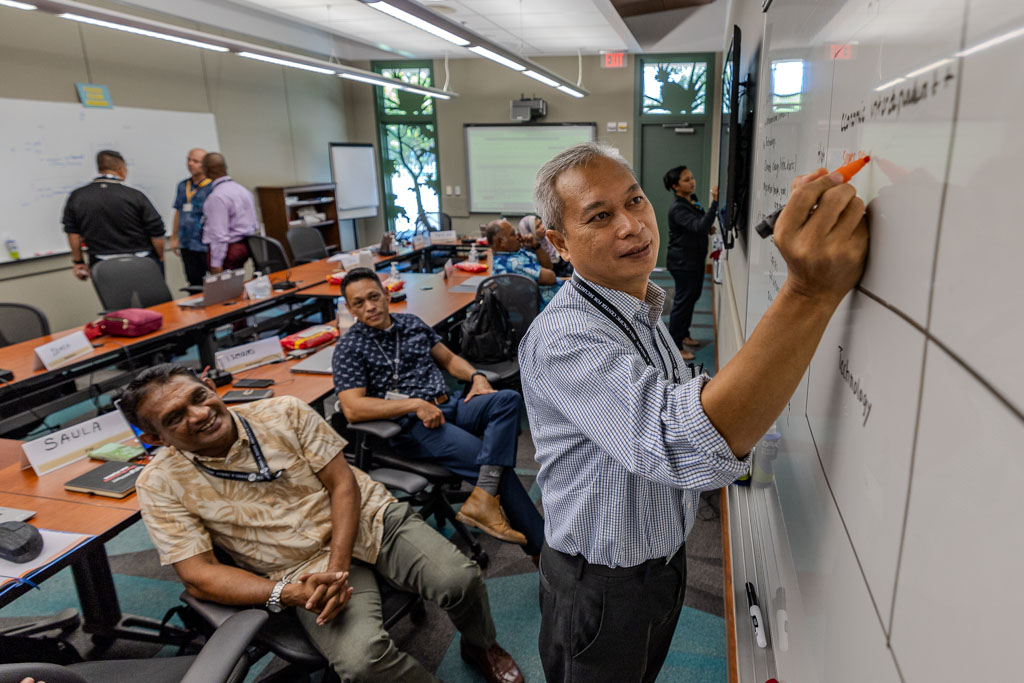Comprehensive Security Cooperation
The Comprehensive Security Cooperation (CSC) course is a 4-week in-resident executive program offered three times a year for mid-level military, government, and non-government professionals who intersect with the security sphere.
Fellows spend approximately three-quarters of their time on complex, transdisciplinary, and transboundary challenges and about a quarter on specialty security content that deep-dives into a variety of priority areas.
The resulting cross-talk between security professionals from different security sectors fosters understanding and the development of significant relationships and networks.
In parallel with presentations, discussions, and exercises, Fellows assess security environments, identify disruptors, analyze threat systems, and probe governance issues while collaboratively building relationships and mutual understanding.
Throughout the course, Fellows seek to develop resilient solutions to real organizational and regional security issues. These complimentary processes enhance the capacity of regional allies, partners, and others to comprehend and cooperatively address complex security challenges in the Indo-Pacific region, thereby advancing the freedom, openness, stability, prosperity, and security of the Indo-Pacific region.
CSC aims to contribute to a free, open, prosperous and secure Indo-Pacific by:
- Educating: Deepening understanding and encouraging critical evaluation of complex security challenges.
- Connecting: Constructing a network of interdisciplinary practitioners in order to enhance international security cooperation.
- Empowering: Building individual potential and partner capacity to find innovative solutions to complex security challenges, employing a whole-of-society approach.
Critical thinking sessions emphasize the importance of objective, rigorous analysis, while introducing fellows to analytical tools to help them understand complex security challenges.
Geostrategic sessions explore the range of different security challenges, regional security architectures and geostrategic considerations within each geographic sub-region: Northeast Asia, Southeast Asia, South Asia and Oceania. These sessions are complemented by an examination the U.S. Indo-Pacific Strategy.
Security Challenges examined in detail on the course include, but are not limited to, economics and security; maritime security; counterterrorism and irregular warfare; environmental security; health security; media, misinformation and disinformation; and cybersecurity.
Capacity sessions seek to develop strategic-level understanding of such areas as statecraft; security sector governance; interagency cooperation; crisis management; and women, peace and security.
Exercises include strategic table-top exercises which aim to deepen understanding of strategic cooperation and competition between states.
Upon successful completion of this course, you will receive a Course Certificate and Alumni Status.
Upon successful completion and implementation of your Project you will receive a Specialty Security Certificate in your Concentration area.
Elective Series
In addition to the core content, Fellows choose to select a specialty “concentration” or focus area that is of particular interest or professional relevance to them and can assist them with their Fellow Project. Concentrations are deep dives on specific security issues, which allow Fellows with mutual interests from different security sectors to work together on complex challenges.
Each iteration of CSC features a different combination of concentrations, including:
Up coming Elective Series
CSC 25-1 | Feb/Mar
- Maritime Security
- Space Security
- Cybersecurity
CSC 25-2 | May/Jun
- Information Environment
- Understanding China
- Crisis Management
CSC 25-3 | Aug/Sep
- Irregular Warfare
- Economic & Security
- Environmental Security






